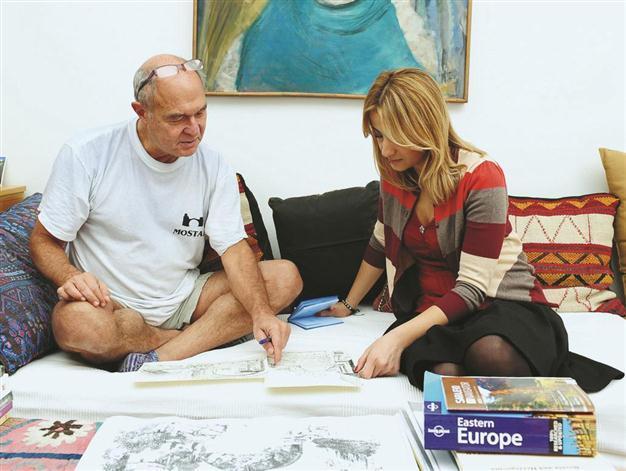How we make prisoners of ourselves, explains writer
İpek Yezdani ISTANBUL - Hürriyet Daily News

Gündüz Vassaf (L) started to write the book just after the 1980 military coup in Turkey. The book was first written in English and translated
into Turkish. Now it is published in its original language. DAILY NEWS photo, Emrah GÜREL
“The rain in Spain falls mainly on the plain.” This is the answer Gündüz Vassaf, the author of “Prisoners of Ourselves,” gave to the first question in a recent interview with the Hürriyet Daily News. An expert on questioning the psychology of totalitarianism in everyday life, as well as demolishing structures and transcending the limitations of genre, Vassaf chose to give a completely unrelated answer when asked a structured question.
“One could talk about anything at anytime; you do not have to directly answer the questions directed at you. Asking questions and expecting direct answers, even in an interview, is a totalitarian exercise. This is true especially with the police or intelligence services. In fact, they torture you with their questions. I feel the same with all questioning,” Vassaf said, explaining the reasoning behind his answer.
Vassaf’s book, “Prisoners of Ourselves,” is full similar examples of oppression in daily life making us prisoners of ourselves.
“Totalitarianism is maintained through oppression and by the individual’s acceptance of a limited state of freedom. Those who do not create their own freedoms choose to live with things as they are, limiting themselves to what the establishment offers: ‘This’ or ‘that,’” he said.
By directing our attention to the imprisoning nature of such a freedom, Vassaf shows how totalitarianism gains its strength from us.
“Prisoners of Ourselves” was first written in English 24 years ago. Vassaf is a philosopher, writer and psychologist educated both in the United States and Turkey. In 1992 the book was translated into Turkish by Turkish writer Ömer Madra, achieving a phenomenally high circulation as a philosophy book. Now, for the first time, it is being published in its original language.
In questioning people’s most basic assumptions, Vassaf advocates night over day, hell over heaven, silence over speech, madness over reason; in challenging preconceptions, he defends traitors rather than heroes and disagreement rather than agreement.
Vassaf started to write the text just after the 1980 military coup in Turkey.

Gündüz Vassaf.
Photo by Emrah Güler
“It was the beginning of the 1980s; I had just resigned from the university in Istanbul after the military coup and started to teach at Marburg University in West Germany. I had some idea of writing about the freedom of the night. I sat down and it just came out in English. It was about the totalitarianism of the day and the freedom of nighttime. And then other ideas of different examples of totalitarianism in everyday life came out,” Vassaf said.
The 1980 military coup in Turkey played an important role in Vassaf’s decision to chase the footsteps of totalitarianism in the daily life.
“At first my idea was to write a book about totalitarianism as we know it; right-wing totalitarianism, Soviet totalitarianism and so on. I started thinking about how we adapt ourselves to the conditions of a military coup during the process which leads to a coup. With good reasoning and rationalization, we adopt a totalitarian way of life and a totalitarian way of thinking. For instance, when the soldiers were in charge, lots of people sought military people in their families. Now Turkey does the same thing with people who performed the hajj in their families. So whatever the reigning order is, in a way we adapt ourselves to it,” Vassaf said.
“That led me to think about how we conform to things in our everyday life without questioning them at all. How we give away our freedoms because we do not think in terms of giving away our freedoms. And therefore daytime is fascism, nighttime is freedom. All the other institutions I mention in the book are all part of an established order and order we create. And then we imprison ourselves in that order,” Vassaf said.
‘Love ends when you posses it’Vassaf also examines the totalitarianism which exists in a love relationship.
“Love is a process,” he said. “It is a process with another person with whom you are sharing the idea of love. But the second you try to posses this idea of love by saying ‘my love’ for instance, or ‘you are the person for me,’ by making it very individual and very specific, then you are beginning to put everything, all your concepts of love and all this weight, onto a single person, and you start moving away from this process of love little by little,” Vassaf said.
Who is Gündüz Vassaf?
Orhan Pamuk, Turkey’s Nobel laureate, describes Turkish philosopher Gündüz Vassaf as the “spokesman for our fantasies, the freest spirit of our prose.”
Vassaf is a prominent writer and psychologist and was educated in America and Turkey. Having first worked as a clinical psychologist, he taught at Boğaziçi University before resigning after the 1980 coup in protest against the law abrogating academic autonomy and freedom. Before turning to writing, he was a research fellow at the Institute of Higher Studies in Vienna, and subsequently guest professor in Germany at the universities of Kassel, Marburg and Bremen. Vassaf’s books, published in Turkish and translated into several languages, focus on the psychology of everyday life, with an overarching theme of the quest for individual freedom. A leading figure in Turkish intellectual life, Vassaf has also had a weekly cultural column in daily Radikal since 1997.

